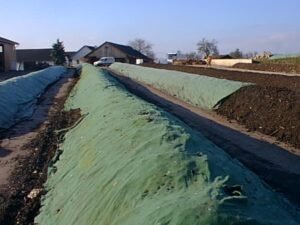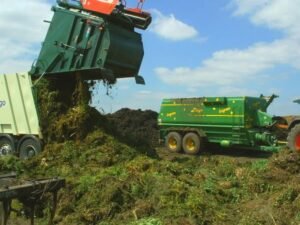Compost Process Optimization

When setting up or modifying a composting project, the decisions made affect the whole process and have economic implications.
The amount of raw material and process time will affect the space and infrastructure requirements, which will have a significant impact on the economics of the project.
The types of composting facilities vary from static heaps to turned open heaps to static aerated heaps, in-vessel composting or combinations thereof, but the basic composting parameters are the same for all facilities.
The amount of feedstock is determined by the project itself and cannot be changed. The type of composting facility is a decision based on available space, site-specific regulations and the economics of the project.
Optimising the composting process starts with the preparation of the raw materials. This has a direct impact on process time and plant parameters such as space, infrastructure and energy consumption.
What is Composting?

Composting is a controlled aerobic process for the natural decomposition of organic matter.
The composting process starts with the mesophilic stage, where composting bacteria are built up.
This stage requires a correct balance of carbon and nitrogen (C/N ratio), moisture and oxygen.
Under the right conditions in the mesophilic phase, the micro-organisms start to break down the organic matter, grow and reproduce.
This stage of the process takes a few days in the right conditions and has an effect on the following stages.
Process Environment

The right parameters for the mesophilic stage have a positive effect on the rest of the process.
Optimisation of the mesophilic process will lead to a reduction in process time, minimising energy consumption and investment in infrastructure.
The creation of this process environment requires special attention to nutrient balance, particle size and moisture content in order to rapidly build up the mesophilic phase.
Proper preparation of compost feedstocks contributes to an efficient composting process and can significantly reduce the time required.
Homogenous feedstock

The challenge is to process raw materials with different physical properties, which can range from wet to dry, solid, fibrous, pasty and/or granular.
Depending on the feed material, coarse ingredients may require pre-crushing and others defibering. Single or twin shaft slow rotation shredders will do the job for crushing coarse material, other inputs may require high speed hammer mills. Bio-Mix shredders are an all-in-one solution for producing a homogeneous mix that meets all the parameters for composting.
Chopping, crushing, grinding or shredding the ingredients increases the surface area of the particles and provides ideal conditions for micro-organisms to decompose.
A homogeneous mixture with the required parameters is a guarantee for successful composting!



Related Publications










